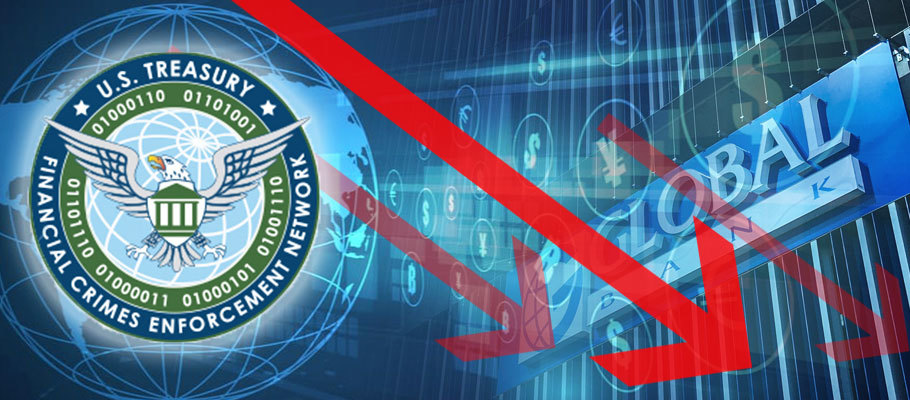
Published: September 26th, 2020
Leaked documents seen by reporters at Buzzfeed have uncovered how over $2 trillion in dirty money has been laundered through the world’s biggest banks. More than 2,500 documents from the US Treasury Department's FinCEN financial crime unit capture how authorities sat on evidence and failed to act.
Back 2016, the Panama Papers uncovered how the world’s elites side-stepped tax with the help of a dodgy Panamanian law firm. The Paradise Papers came a year later and revealed further offshore dirty dealings, with politicians and celebrities named & shamed.
What makes the FinCEN leak different is that it pulls back the curtain hiding global corruption by institutions and banking brands that are household names, rather than the wrongdoings of a handful of well-heeled miscreants.
Money laundering is a stain on the financial services industry. It drains public funds, adds to inequality, undermines democracy, and when kleptocrats loot the public treasury, it can even destabilise nations. Some of the world’s biggest banks have turned out to play a vital role in facilitating it.
“You’ve got so-called upstanding businesspeople in crisp white shirts and expensive suits feeding off tragic circumstances and helping corrupt politicians siphon taxpayer funds or the proceeds of criminal activity out of their country,” said a former financial crime investigator at US-based Wachovia Bank.
Rules designed to thwart financial crime seem to have let it flourish instead. All a bank needs to do is submit a notice that it suspects criminal activity in its accounts. That basically stops the organisation and its executives from facing prosecution. It effectively gives them free rein to continue moving the dirty money – and of course, keep collecting their fees.
The leak documents how huge corruption and money laundering is in the global banking system, even as it flows under the noses of police and regulators.
FinCEN (The Financial Crimes Enforcement Network is the agency inside the US Treasury Department that fights terrorist financing, money laundering and other financial crimes. Every year it gathers millions of suspicious activity reports (SARs) and then distributes them to relevant US law enforcement agencies and the financial investigation arms of global central banks. FinCEN famously publishes Kleptocracy Weekly, which details the suspicious dealings of foreign leaders suspected of wrongdoing.
Leaked files implicate London-based HSBC in the transfer of millions of pounds in stolen funds across the globe. FinCEN says the transactions kept happening even after evidence of illegal activity was shown to bank executives by US authorities.
London-based Standard Chartered is implicated in a plot to shift funds for Jordan’s Arab Bank some ten years after several of the bank’s clients were caught financing terrorism.
SAR documents also have transactions flowing through Germany’s Deutsche Bank turning up in the files, with accusations that it moved money connected to drug crime and terrorism.
London financial institutions come up a lot in the FinCEN dossier, and while several financial centres around the world appear in the SARs, London features more prominently than most, to the extent that it looks like the global capital for financial criminality.
One of the FinCEN leak’s most astounding revelations is that US giant JP Morgan allegedly helped move more than $1 billion in suspicious funds through a London entity. The bank has since said it had no idea who was behind the money at the time of the transactions. It was later disclosed that the funds were connected to Semion Mogilevich, a shadowy figure included on the FBI’s ‘Most Wanted’ list.
Mogilevich had previously been blocked from using financial services in the EU and US, but according to the FinCEN Files, he has been active in London’s high-stakes art market.
London banks aren’t the only UK entities caught up in the scandal. The FinCEN Files also show numerous suspicious donations to the UK’s governing Conservative Party from figures connected to organised crime.
But the findings aren’t limited to the traditional finance world.
Another element of the leaked documents uncovers the extent to which the crypto industry, which is no stranger to fraud, hacks, scams, and assorted Ponzi Scheme, has been party to traditional financial crime.
Infamous online payment processing company Mayzus Financial Services, known for its role allegedly assisting clients implicated in the BTC-e money laundering ring, turns up in no less than 35 SARs included in the FinCEN leak. That makes Mayzus Financial the most frequently cited suspect in the massive document dump.
After the arrest of alleged BTC-e owner Aleksander Vinac, Mayzus admitted in a statement that amongst their clients there might have been legal entities 'operating on the BTC-e exchange, or private citizens using or even employed by the exchange.’
Its statement also said the business had turned over information about these individuals to UK law enforcement.
What's notable about the FinCEN leak is how little concrete action is taken once a firm or individual has been named in a SAR.
Take the example of one of America’s oldest banks, Bank of New York Mellon. It has been accused of allegedly facilitating the wire transfer of more than a hundred million dollars linked to the OneCoin crypto scandal. Taken together, the transactions amount to more than Worth $137 million. They were shared with police and regulators after FinCEN investigators flagged their suspicious nature, and realise they may have been used as a means to hide illicit funds.